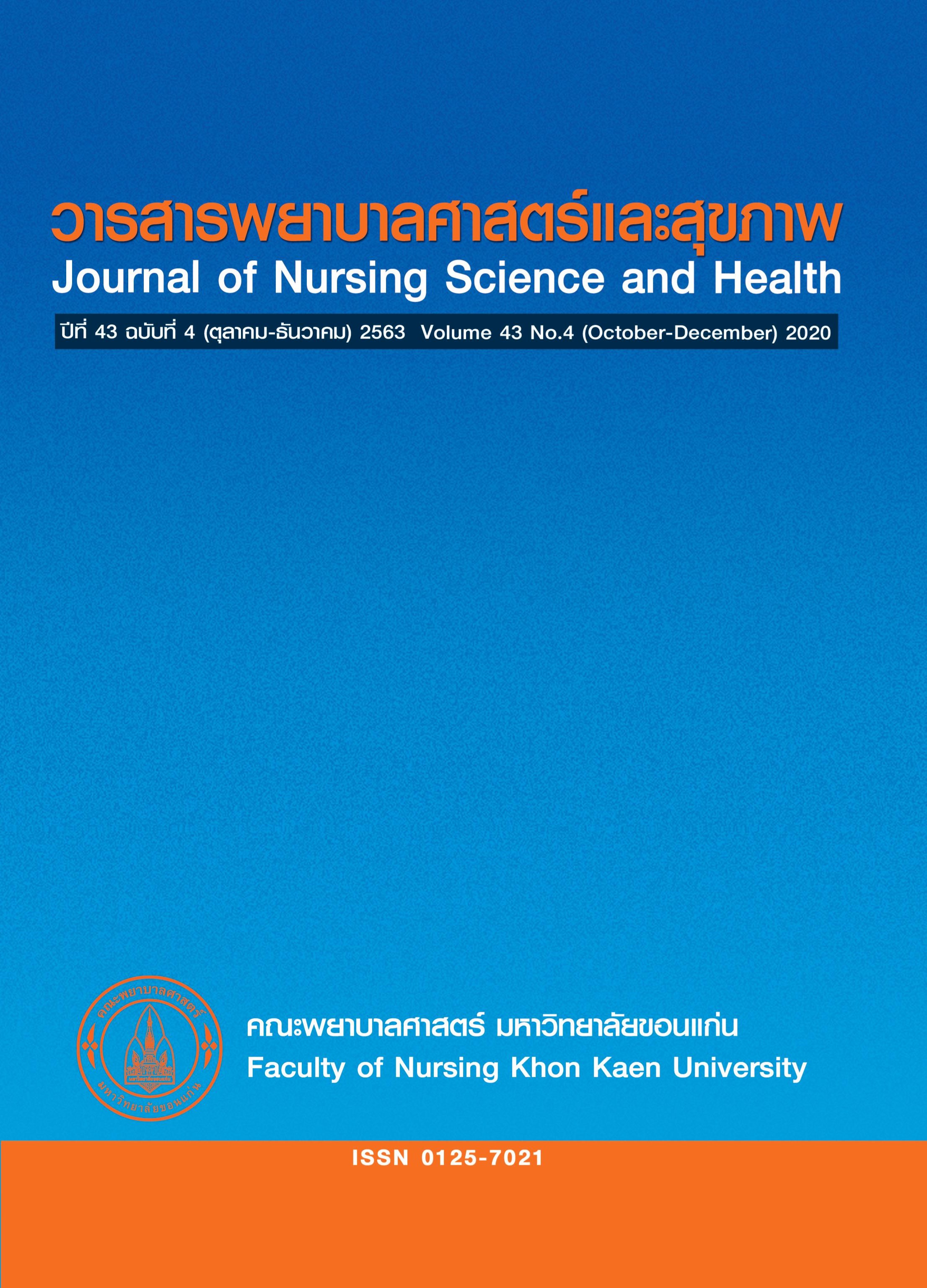การพัฒนาความรู้และทักษะด้านการพยาบาลวิกฤตตามการรับรู้ของผู้ผ่านการอบรมหลักสูตรการพยาบาลผู้ป่วยวิกฤต (ผู้ใหญ่)
คำสำคัญ:
การอบรมระยะสั้น, การพยาบาลวิกฤต, ทักษะ, ความรู้บทคัดย่อ
วิจัยแบบพรรณนาเพื่อศึกษาการรับรู้ความรู้และทักษะของผู้ผ ่านการอบรมหลักสูตรเฉพาะทางการพยาบาลผู้ป่วยวิกฤต (ผู้ใหญ่)โดยส่งแบบสอบถามทางไปรษณีย์ไปยังกลุ่มตัวอย่าง 2 กลุ่ม ได้แก่พยาบาลที่ผ่านการอบรม และหัวหน้างาน/ผู้ร่วมงาน จำนวนกลุ่มละ 157 คน จากการสุ่มแบบหลายชั้น ผลพบว่า ผู้ผ่านการอบรมรับรู้ว่าตนเองพัฒนาความรู้และทักษะพยาบาลวิกฤตในระดับมาก (Mean 4.03,SD 0.79) สอดคล้องกับการรับรู้ของหัวหน้างาน/ผู้ร่วมงาน (Mean 4.02, SD 0.76) เช่นกัน ด้านที่ผู้ผ่านการอบรมรับรู้ว่าพัฒนา มากที่สุด คือ ประสานความร่วมมือกับทีมสุขภาพ (Mean 4.25, SD 0.81) ส่วนหัวหน้างาน/ผู้ร่วมงานรับรู้ว่าด้านที่พัฒนามากที่สุด มี3 ด้านเท่ากัน (Mean 4.20) คือ ปฏิบัติบทบาทพยาบาลวิกฤต ให้คำปรึกษาแก่ผู้รับบริการและพัฒนาตนเองอย่างต่อเนื่อง (SD 0.73, 0.77, และ 0.81 ตามลำดับ)
เอกสารอ้างอิง
Bennett KA, Robertson LC, Haddad MA. Recognizing the critically ill patient. Anaesth. Intensive Care Med 2016; 17(1): 1-4. Available from: https://doi.org/10.1016/j.mpaic. 2015.10.001
Health administration division, Ministry of Public Health. Service Plan 2013. Bangkok: The agricultural co- operative federation ofThailandPress. (in Thai)
ThaiNursing Council. The 2005 announcement of Thai Nursing Council entitled standard of nursing and midwifery service at secondary and tertiary levels. Rachakitchanubeksa issue 122 section 94 d November 3;2005: 42. (in Thai)
ThaiNursing Council. The 2014 announcement of Thai Nursing Council entitled criteria for specific nursing training program development and program management. Rachakitchanubeksa issue 131 special section 38 d February 25;2014: 28. (in Thai)
Topno H. Evaluation of training and development: an analysis of various models. IOSR-JBM 2012; 5(2): 16-22.
Thongchai C, Hanucharurnkul C. Advanced nursing practitioner’s efficiency in critical patient care: A case study. Thai Journal of NursingCouncil2013;28(3):80-94.(inThai)
Tracey JB, Tews MJ. Training effectiveness: Accountingfor individualcharacteristicsandthe work environment. Cornell Hosp Q 1995;36(6): 36-42. doi.org/10.1177/00108804950 3600615
Farjad S. The evaluation effectiveness of training courses in university by Kirkpatrick model (case study: Islamshahr university). ProcediaSoc BehavSci 2012; 46: 2837-41. doi.org/10.1016/j.sbspro.2012.05.573
GaoP, Xiang H, LiuS, Liu Y, DongS, LiuF, et al. Evaluationof a consultingtrainingcourse for international development assistance for health. BMC Med Educ 2018; 18: 234. doi.org/10.1186/s12909-018-1339-3
Jain S. Methods of training programmes evaluation: A review. J Commer 2014; 6(2): 19-30.
Nickols FW. Why a stakeholder approach to evaluating training. Adv Dev Hum Resour 2005; 7(1): 121-34.
Kirkpatrick DL. Evaluating training program: The four level. 2nd ed. San Francisco, CA: Berrett-KoehlerPublisher;1998.
Jane S, Prichard JS, Stratford RJ, Bizo LA. Team-skills training enhances collaborative learning. Learn Instr 2006; 16: 256-65. doi:10.1016/j.learninstruc.2006.03.005
Andersson D, Rankin A, Diptee D. Approaches to team performance assessment: A comparison of self-assessment reports and behavioral observer scales. Cogn Tech Work 2017;19:517-28. doi.org/10.1007/s10111-017-0428-0
Lazazzara A, ZaS. Theeffectof subjectiveage onknowledge sharinginthepublic sector.Pers Rev 2009; 49(1): 303-23.doi.org/10.1108/PR-07-2018-0248
Benner P. Using the dreyfus model of skill acquisition to describe and interpret skill acquisition and clinical judgment in nursing practice and education. Bull Sci Technol Soc 2004; 24(3): 188-99. doi:10.1177/0270467604265061
CunninghamC, BrysiewiczP,SepekuA,White L, Murray B, Lobue N, et al. Developing an emergency nursing short course in Tanzania. AFEM 2017; 7(4): 147-50. doi.org/10.1016/j.afjem.2017.08.002
Wanjikua G,Janeway H,FoggleJ,Partridge R, Wang Y, Kearney A,etal. Assessingtheimpact of an emergency trauma course for senior medicalstudentsinKenya.AFEM2017; 7(4):167-71. doi.org/10.1016/j.afjem.2017.04.013
ดาวน์โหลด
เผยแพร่แล้ว
รูปแบบการอ้างอิง
ฉบับ
ประเภทบทความ
สัญญาอนุญาต
วารสารพยาบาลศาสตร์และสุขภาพเป็นเจ้าของลิขสิทธิ์ในการเผยแพร่ผลงานที่ตีพิมพ์ห้ามผู้ใดนำบทความที่ได้รับการตีพิมพ์ในวารสารพยาบาลศาสตร์และสุขภาพไปเผยแพร่ในลักษณะต่าง ๆ ดังนี้ การนำบทความไปเผยแพร่ออนไลน์ การถ่ายเอกสารบทความเพื่อกิจกรรมที่ไม่ใช่การเรียนการสอน การส่งบทความไปตีพิมพ์เผยแพร่ที่อื่น ยกเว้นเสียแต่ได้รับอนุญาตจากวารสารพยาบาลศาสตร์และสุขภาพ



